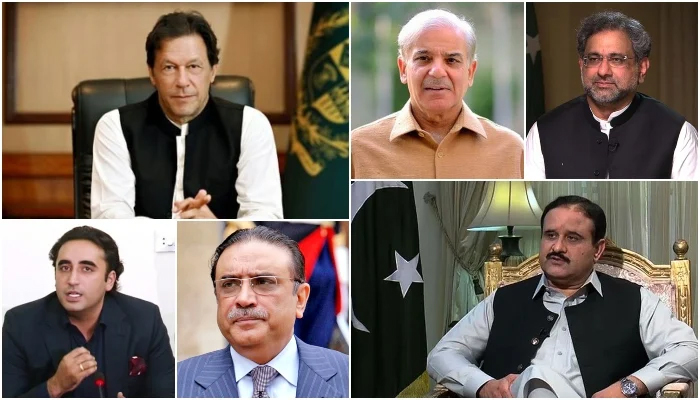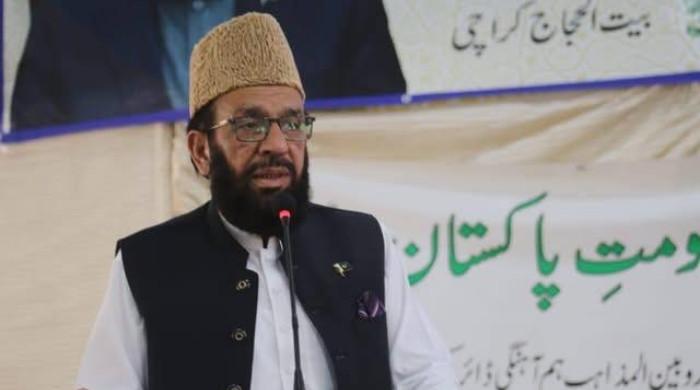FBR releases 2018 tax details of parliamentarians, chief ministers
PML-N leader Shahid Khaqan Abbasi paid the highest tax of Rs241,329,362 in 2018
September 18, 2020

ISLAMABAD: A tax directory of Pakistan's elected representatives for the year 2018 has been published by the Federal Board of Revenue (FBR).
According to FBR, former prime minister and PML-N leader Shahid Khaqan Abbasi paid the highest tax of Rs241,329,362.
Former president and PPP Co-Chairperson Asif Ali Zardari paid Rs2,891,455, whereas PPP Chairperson Bilawal Bhutto-Zardari paid Rs294,117 in taxes.
Former Punjab chief minister and PML-N President Shehbaz Sharif paid Rs9,730,545. Shehbaz's son, Hamza, paid Rs8,705,368 in taxes.
Prime Minister Imran Khan paid Rs282,449.
Among the four provincial chief ministers, the greatest amount was paid by Balochistan's Jam Kamal at Rs4,808,948, while Sindh's Murad Ali Shah paid Rs1,022,184 and Khyber Pakhtunkhwa's Mahmood Khan paid Rs235,982.
Chief Minister Punjab Usman Bazdar did not pay any tax during this period.
The tax payments of other elected representatives for the same year are as follows:
(Note: The following list does not track how much taxes have been paid individually by parliamentarians as members of associations of persons (AOPs), as AOPs pay taxes as separate entities. Therefore, some parliamentarians may have contributed more to the national exchequer than just the taxes they reported having individually paid.)
- Information and Broadcasting Minister Shibli Faraz paid Rs367,460
- Human Rights Minister Dr Shireen Mazari paid Rs2,435,650
- Foreign Minister Shah Mahmood Qureshi paid Rs183,900
- Interior Minister Ijaz Ahmad Shah paid Rs58,120
- Defence Minister Pervez Khattak paid Rs1,826,899
- Law Minister Farogh Naseem paid Rs35,135,459
- Planning Minister Asad Umer paid Rs5,346,342
- Aviation Minister Ghulam Sarwar Khan paid Rs1,046,669
- Railways Minister Sheikh Rashid Ahmed paid Rs579,011
- Narcotics Control Minister Azam Khan Swati paid Rs590,916
- Power Minister Omar Ayub Khan paid Rs26,055,517
- States and Frontier Regions (SAFRON) Minister Shehryar Afridi paid Rs183,900
- Kashmir and Gilgit-Baltistan Affairs Minister Ali Amin Gandapur paid Rs378,763
- Communications and Postal Services Minister Murad Saeed paid Rs374,728
- National Food Security and Research Minister Fakhar Imam paid Rs5,212,137
- Industries and Production Minister Hammad Azhar paid Rs22,445
- Education Minister Shafqat Mahmood paid Rs231,730
- Economic Affairs Minister Khusro Bukhtiar paid Rs624,292
- Maritime Affairs Minister Ali Haider Zaidi paid Rs896,191
- IT and Telecommunication Minister Aminul Haque paid Rs66,749
- National Assembly Speaker Asad Qaiser paid Rs537,730
- Senate Chairperson Sadiq Sanjrani paid Rs1,363,414
- Senate Deputy Chairperson Saleem Mandviwalla paid Rs1,591,722
- State Minister for Parliamentary Affairs Ali Muhammad Khan paid Rs430,695
Earlier, PM Imran's finance adviser, Dr Abdul Hafeez Shaikh, shared details about the tax paid by the parliamentarians, saying the elected provincial representatives paid Rs340 million in taxes in the same year.
Some 90 senators and 311 MNAs paid a total of Rs800 million in taxes, he added.
Shaikh said the FBR is "striving for transparency in the tax system", adding that the tax and audit systems were being automated and computerised.
"We wish to make the FBR's tax system transparent," he said, announcing that the institution had made two major decisions. "We are not bringing the tax audit under the control of any officer; it should not be so that a single officer selects the people of their choice in the audit.
"We are trying to have fewer people audited; we do not wish to audit a lot of people. This year, more than 10,000 cases have been selected for auditing," Shaikh noted, adding that less than 1% of the people would be audited for income tax.
The adviser stressed, however, that the salaried class as well as the beneficiaries of the tax amnesty scheme were not included in the audit. A 1.7% audit of sales tax would also be carried out, he said.
The adviser said people wished to be informed about taxpayers and, therefore, the details of those from 2018 "will be published today".
"The tax details of Pakistan's elected representatives will be published today [and] a tax directory of parliamentarians is being issued," he added.
"The government's basic philosophy is to collect taxes," he underlined, adding that the PTI regime wished for taxes to be collected in such a way that there were no undue hardships for the business community and no harassment of taxpayers.
Speaking of the industries, budget, as well as the coronavirus pandemic and its impact on the economy, Shaikh said the taxes on raw materials were reduced to zero and the government maintained subsidies for industries despite challenging circumstances.
"The government is giving subsidies on electricity and gas to industries, as well as subsidies on loans," he said. "We took immediate steps to improve the economy but still did not choose to impose any new taxes when the Budget 2020 was announced.
"We are witnessing economic recovery after the coronavirus pandemic," he added.
"Pakistan's exports have increased" during the same period, the adviser emphasised, adding that the government had decided to increase the country's exports.











